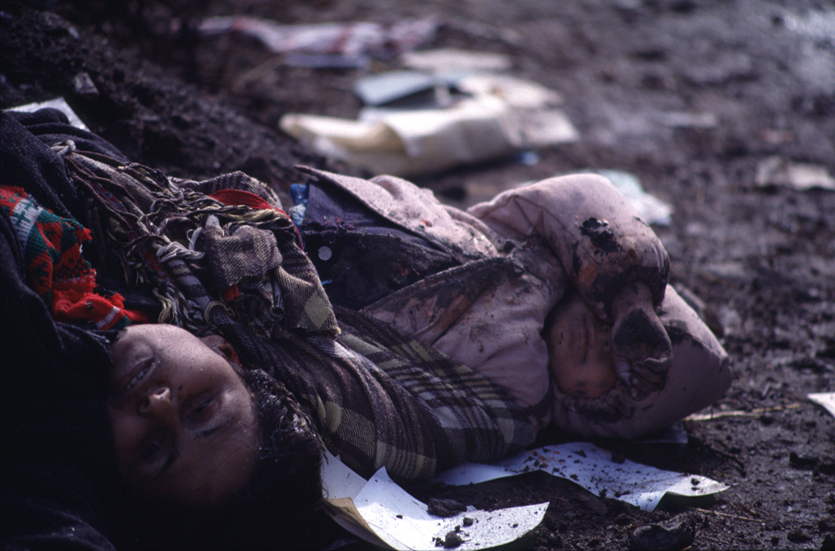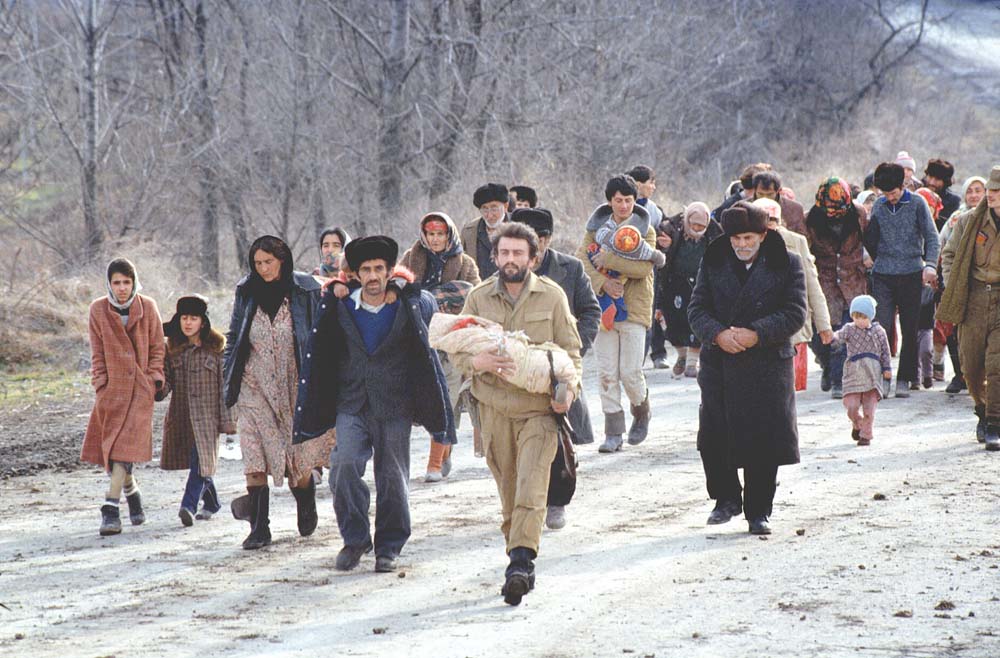Today, Azerbaijanis are paying homage to the victims of the Khojaly genocide, which was committed by Armenia and left 613 dead, 487 injured and saw more than 1,200 taken prisoner.
Thousands of people gathered in embassies, community centers and college campuses around the world, 27 years after Armenia's forces, backed by Infantry Guard Regiment No. 366 from collapsing Soviet army, invaded the town of Khojaly located in the Nagorno-Karabakh region of Azerbaijan.
In Baku, people marched across central streets and gathered at a bronze sculpture that depicts a woman with a dead child in her arms – symbolizing those caught off guard on a cold night from February 25 to 26 in 1992.
Mass killings and ethnic cleansing of Azerbaijani civilians in Khojaly occurred throughout what was a bloody, three-year war fought between the South Caucasus neighbors Armenia and Azerbaijan, between 1991 and 1994. Armenia kicked off military aggression against Azerbaijan to occupy the Nagorno-Karabakh region, which is historically and internationally recognized as the territory of Azerbaijan, but was partially populated by Armenians living alongside indigenous Azerbaijanis.
A sudden but well-organized attack by Armenia's forces hit the town of Khojaly in the middle of the night and its unarmed residents were forced to flee. The area’s residents were trying to escape via different directions, through mountains and forests, in order to avoid patrols shooting at them.
Around 1 a.m. on February 26, 1992, Zanura Salimova, who was pregnant at that time and her family left their home and headed towards the forest.
“We hoped to sit out the night in the forest and then to return home. We did not think we were leaving forever,” she remembers now.
Zanura and six other people were walking through the snow-capped mountains, led by Alif Hajiyev, the Commandant of Khojaly Airport, who would later be posthumously awarded the title of the National Hero of Azerbaijan. When a group of people came out on the road, Alif ordered them to lie down as there was a patrol right in front of them. Those who left far behind the main group did not hear him and were killed.
“We crossed the road and saw a terrible sight when turned around. You have no idea how it looked: it seemed that the snow was covered with a red crust,” Zanura said. She lost her mother-in-law who was left on the road, as well as uncle and father-in-law – both of them were taken hostages. The baby born after the tragedy did not live even three months.
Some of the refugees, who nevertheless managed to get to neighboring Agdam, were later evacuated; some, mostly women and children, froze during the wanderings in the mountains. The rest were captured near the villages of Pirjamal and Nakhchivanly; some of the captives were shot.
Armenia's forces killed 613 civilians, including 106 women, 63 children, and 70 elderly people, and took hostage 1,275 others. Another 150 Azerbaijani nationals went missing, whose fates remain unknown to this day. Those suffering major injuries or having been maimed totaled 487, including 76 children.
On February 28, a group of journalists in two helicopters managed to get to the outskirts of Khojaly, but due to heavy shelling by Armenian militants, they were able to take out only four bodies. Azerbaijani journalist Chingiz Mustafayev and Yury Romanov, a Russian television reporter, were the first to visit the site of the tragedy.
“I looked out into the round window of the helicopter and literally pulled back from the incredibly scary scene,” Romanov remembers. “All this enormous area to the near horizon was littered with the corpses of women, old men, old women, boys and girls of all ages, from an infant to a teenager.”
“The grandmother, with an uncovered head, lied face down next to a tiny girl in a blue jacket with a hood. For some reason, their legs were tied with barbed wire, and the grandmother had her hands tied as well. Both were shot in the head. With the last gesture, a little girl, about four years old, stretched her arms towards her dead grandmother. Stunned, I didn't even immediately think about the video camera.”

The massacre in Khojaly is widely remembered throughout Azerbaijan as a pinnacle of the Armenian aggression when mass murder with an ethnic bent was one of the darkest moments in a three-year war fought between the two South Caucasus neighbors between 1991 and 1994. The war claimed the lives of over 30,000 Azerbaijanis, while nearly one million Azerbaijanis were internally displaced and 4,000 went missing. The full-scale war came to a stop in 1994, thanks to a ceasefire, but Azerbaijan’s Nagorno-Karabakh region and seven surrounding districts are still occupied by Armenia.
In 2008, Leyla Aliyeva, the Vice-President of the Heydar Aliyev Foundation and the General Coordinator at the Islamic Cooperation Youth Forum (ICYF) for Inter-cultural Dialogue, created a campaign and hashtag that encouraged people to demand #JusticeforKhojaly.
Sixteen countries from around the world such as the Czech Republic, Romania, Slovenia, Bosnia and Herzegovina, Mexico, Colombia, Peru, Panama, Pakistan and Indonesia as well as Scotland from the United Kingdom and 24 state governments in the United States, including Texas, Florida, Pennsylvania, New Jersey, Georgia, Massachusetts, Indiana, Tennessee, Wisconsin, Arizona and Connecticut, have officially recognized the events in Khojaly as genocide of Azerbaijanis.







 Iran's senior military leaders described the drone and missile attack on Israel on April 14 night as “successful".
Iran's senior military leaders described the drone and missile attack on Israel on April 14 night as “successful".
 The number of evacuees from flooded areas in Kazakhstan has reached 97,852 people, including about 32,856 children since March 27.
The number of evacuees from flooded areas in Kazakhstan has reached 97,852 people, including about 32,856 children since March 27.
 Iranian President Ebrahim Raisi warned Israel that it would face a "real and extensive" response if it makes any "mistake" following Tehran’s missi...
Iranian President Ebrahim Raisi warned Israel that it would face a "real and extensive" response if it makes any "mistake" following Tehran’s missi...
 The Kazakh authorities have increased their arbitration claims against international oil companies involved in the development of the Kashagan oil ...
The Kazakh authorities have increased their arbitration claims against international oil companies involved in the development of the Kashagan oil ...



